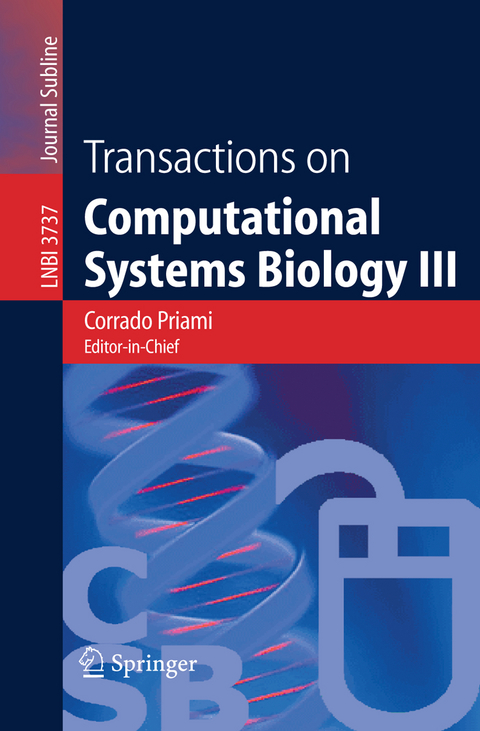
Transactions on Computational Systems Biology III
Seiten
2005
|
2005
Springer Berlin (Verlag)
978-3-540-30883-6 (ISBN)
Springer Berlin (Verlag)
978-3-540-30883-6 (ISBN)
In the last few decades, advances in molecular biology and in the research - frastructure in this ?eld has given rise to the omics revolution in molecular biology,alongwiththeexplosionofdatabases:fromgenomicstotranscriptomics, proteomics, interactomics,and metabolomics. However,the huge amount of b- logicalinformationavailablehasleftabottleneckindataprocessing:information over?ow has called for innovative techniques for their visualization, modelling, interpretationandanalysis.The manyresultsfromthe ?eldsofcomputerscience andengineeringhavethenmetwithbiology,leadingto new,emergingdisciplines such as bioinformatics and systems biology. So, for instance, as the result of - plicationoftechniquessuchasmachinelearning,self-organizingmaps,statistical algorithms,clusteringalgorithmsandmulti-agentsystemstomodernbiology,we can actually model and simulate some functions of the cell (e.g., protein inter- tion, gene expression and gene regulation), make inferences from the molecular biology database, make connections among biological data, and derive useful predictions. Today, and more generally, two di?erent scenarios characterize the po- genomic era. On the one hand, the huge amount of datasets made available by biological research all over the world mandates for suitable techniques, tools and methods meant at modelling biological processes and analyzing biological sequences. On the other hand, biological systems work as the sources of a wide range of new computational models and paradigms, which are now ready to be applied in the context of computer-based systems.
Computer-Aided DNA Base Calling from Forward and Reverse Electropherograms.- A Multi-agent System for Protein Secondary Structure Prediction.- Modeling Kohn Interaction Maps with Beta-Binders: An Example.- Multidisciplinary Investigation into Adult Stem Cell Behavior.- Statistical Model Selection Methods Applied to Biological Networks.- Using Secondary Structure Information to Perform Multiple Alignment.- Frequency Concepts and Pattern Detection for the Analysis of Motifs in Networks.- An Agent-Oriented Conceptual Framework for Systems Biology.- Genetic Linkage Analysis Algorithms and Their Implementation.- Abstract Machines of Systems Biology.
| Erscheint lt. Verlag | 12.12.2005 |
|---|---|
| Reihe/Serie | Lecture Notes in Computer Science | Transactions on Computational Systems Biology |
| Zusatzinfo | VII, 169 p. |
| Verlagsort | Berlin |
| Sprache | englisch |
| Maße | 155 x 235 mm |
| Gewicht | 285 g |
| Themenwelt | Informatik ► Software Entwicklung ► User Interfaces (HCI) |
| Mathematik / Informatik ► Informatik ► Theorie / Studium | |
| Schlagworte | Bioinformatics • Bioinformatik • biological systems analysis • cellular systems • Complexity • Computational Biology • computational life science • computational systems biology • Computer • Computer Science • data visualisation • DNA analysis • evolutionary biology • genetic linkage analysis • motif finding • Protein Structure Prediction • Proteomics • Simulation • systems biology • systems modeling • Visualization |
| ISBN-10 | 3-540-30883-0 / 3540308830 |
| ISBN-13 | 978-3-540-30883-6 / 9783540308836 |
| Zustand | Neuware |
| Haben Sie eine Frage zum Produkt? |
Mehr entdecken
aus dem Bereich
aus dem Bereich
Aus- und Weiterbildung nach iSAQB-Standard zum Certified Professional …
Buch | Hardcover (2023)
dpunkt Verlag
34,90 €
Lean UX und Design Thinking: Teambasierte Entwicklung …
Buch | Hardcover (2022)
dpunkt (Verlag)
34,90 €
Wissensverarbeitung - Neuronale Netze
Buch | Hardcover (2023)
Carl Hanser (Verlag)
34,99 €


